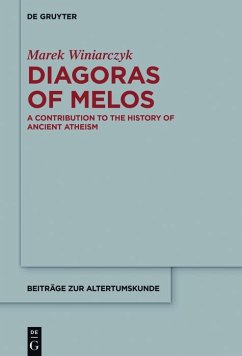Diagoras of Melos (lyric poet, 5th c. B.C.) has received special attention for some time now because he was regarded as a radical atheist and the author of a prose work on atheism in antiquity. He was notorious for revealing and ridiculing the Eleusinian Mysteries and was condemned for impiety at Athens. The present book evaluates Diagoras' biography and shows that he cannot be considered to have been an atheist in the modern sense.
Dieser Download kann aus rechtlichen Gründen nur mit Rechnungsadresse in A, B, BG, CY, CZ, D, DK, EW, E, FIN, F, GR, HR, H, IRL, I, LT, L, LR, M, NL, PL, P, R, S, SLO, SK ausgeliefert werden.
"[...] the meticulous attention to the sources make this a valuable and indispensable contribution to the study of ancient atheism."
Jenny Strauss Clay in: Religious Studies Review 43/3 (2018), 278
"I greatly admire Winiarczyk's erudition and scholarship: this book is a masterful, indeed brilliant philological epideixis, and will be the foundation for all future research on Diagoras. [...] Winiarczyk is a lucid and careful writer, and a pleasure to read."
Tim Whitmarsh in: Bryn Mawr Classical Review 2018.08.36
"[...] insgesamt stellt die Monographie, die sich auf hohem philologischen Niveau bewegt, eine der wichtigsten Publikationen zu Diagoras und mit diesem zum antiken Atheismus dar."
Wolfgang Will in: Theologische Literaturzeitung 142 (2017) Nr. 9, S. 885
Jenny Strauss Clay in: Religious Studies Review 43/3 (2018), 278
"I greatly admire Winiarczyk's erudition and scholarship: this book is a masterful, indeed brilliant philological epideixis, and will be the foundation for all future research on Diagoras. [...] Winiarczyk is a lucid and careful writer, and a pleasure to read."
Tim Whitmarsh in: Bryn Mawr Classical Review 2018.08.36
"[...] insgesamt stellt die Monographie, die sich auf hohem philologischen Niveau bewegt, eine der wichtigsten Publikationen zu Diagoras und mit diesem zum antiken Atheismus dar."
Wolfgang Will in: Theologische Literaturzeitung 142 (2017) Nr. 9, S. 885


